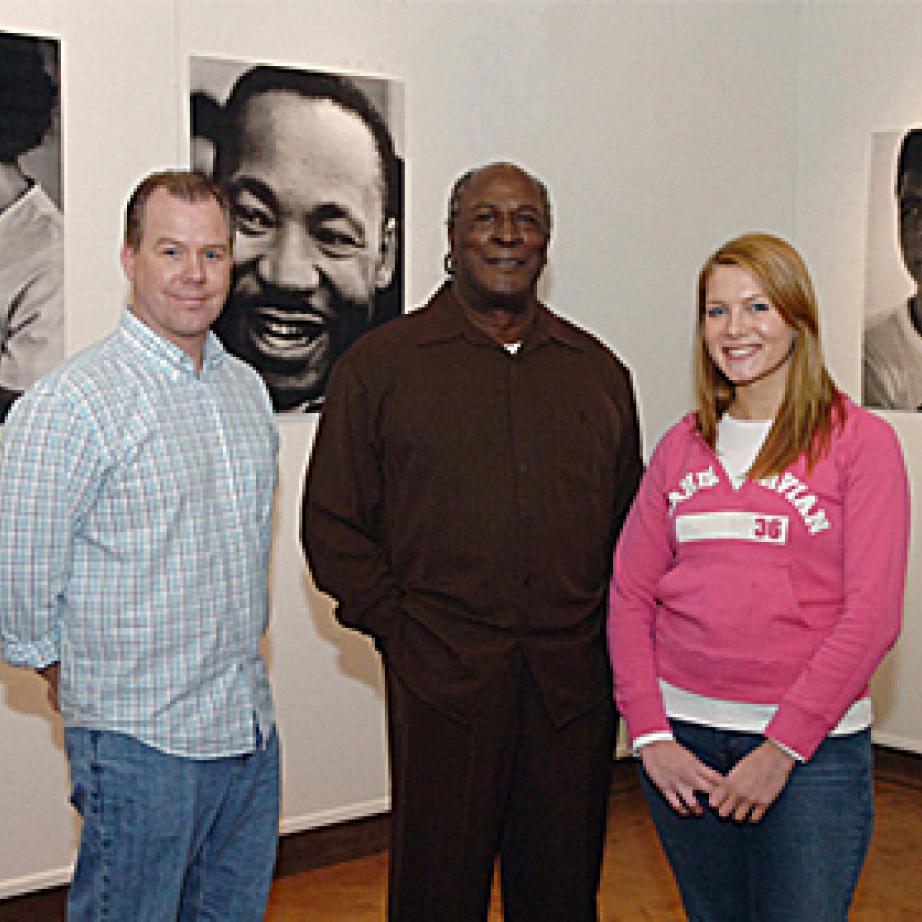Friday, Mar 26, 2010
Months after being screened at the prestigious Cannes Film Festival, Stills of the Movement: The Civil Rights Photojournalism of Flip Schulke is still earning acclaim. Most recently, the documentary brought honors to Dr. Shawn Kildea, assistant professor of Communication and co-producer of the film, at the National Broadcasting Society’s 68th Annual Convention in Dallas on March 13. Kildea earned first prize in the professional’s category of Documentary, Comedy or Drama, for the film, which chronicles the career of the legendary lensman who captured the pain of the Civil Rights movement on film in the turbulent 1960s.
The images of Graeme Phelps “Flip” Schulke brought the Civil Rights movement into millions of homes far removed from the front lines. Kildea began production on Stills of the Movement two years ago, along with co-producer Patty Wittenburg ’09, and screened the film for the first time in the spring of 2009.
“Naturally, we were excited and honored just to be nominated, but to win is very pleasing,” said Kildea, who was not able to be present in Dallas to accept the award. Scott Alboum, video technologies coordinator, accepted the NBS award on Kildea’s behalf.
Schulke’s photographs of Dr. Martin Luther King Jr., civil rights demonstrations, protests and riots, and other iconic figures of the movement such as boxing great Muhammad Ali, gave people from every corner of America a glimpse into the struggles of African-Americans to attain equality in the turbulent 1960s.
Kildea and Wittenburg also scored a coup by having veteran actor John Amos narrate Stills of the Movement. Amos, a New Jersey native and longtime resident, catapulted to fame in the mid-1970s by playing James Evans Sr. in the innovative television sitcom Good Times, and sustained it in the role of Kunta Kinte in the groundbreaking ABC miniseries Roots.
Since being shown at Cannes, Stills of the Movement has been screened at a number of universities, including Morehouse College in Atlanta, a historically black institution of higher learning, and at the University of Miami during the prestigious film school’s Communication Week. Both screenings were followed by panel discussions.
“The screening at Morehouse came at the end of the college’s Dr. Martin Luther King Jr. Week, and we had about 400 people there to see the film,” Kildea said. “Flip also worked at the University of Miami for a while, and two of his former colleagues were there to speak about him, too.”
Schulke was the only photographer who managed to be present at the wake of slain civil rights leaders Medgar Evers in 1963, following his assassination by Ku Klux Klan member Byron De la Beckwith. “Evers’ widow, Myrlie, wrote that when she saw Schulke there, she was angry to see not only a photographer there, but a white one,” Wittenburg explained last year, prior to the film’s screening at Cannes. “She yelled at him, but when Schulke lowered his camera, Myrlie saw his tears, and all her hate left her body at that moment.”
Kildea and Wittenburg were recently able to speak with Myrlie Evers, and portions of that interview have been included in the most recent version of Stills of the Movement, which now runs at 32 minutes. “It’s done now, and we’re at the point where we can start entering the film in competitions,” said Kildea, who will guest-lecture at the University of Alabama in the fall, after showing the documentary to the school’s photojournalism students.
Schulke had established a friendship with King then extended back to 1958, when he was sent to photograph King for a story in Ebony magazine. In Stills of the Movement, Amos details an exchange between King and Schulke in March 1965, toward the beginning of the march on Birmingham, Ala., from Selma. As Amos tells the story, police were beating a child with a club, and Schulke stepped in to pull back an officer’s weapon when King said to him, “We as a people have been beaten down and murdered for hundreds of years. Your job is to document what is happening to us. You cannot be a participant.”
By that time, King had welcomed Schulke into his circle, and he became the principle chronicler of the struggle to achieve racial integration across the United States. Following King’s murder, Schulke’s heartrending shot of a tear rolling down the veiled cheek of King’s widow Coretta Scott King illustrated her grief on the April 19, 1968, cover of Life magazine.
Schulke earned further renown for his iconic shot of Muhammad Ali, clad only in boxing trunks, shadowboxing at the bottom of a swimming pool. He was also one of the first photographers admitted into the Texas Book Depository in Dallas following the assassination of President John F. Kennedy.

